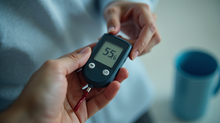Conquering Sick Days: Creating a Diabetes Survival Kit for Empowered Health Management
- Maureen Sullivan
- Nov 5, 2024
- 4 min read

Living with diabetes often means facing unexpected challenges, especially when illness strikes. Sick days can create added difficulties in managing blood sugar levels. Whether it's battling a common cold or dealing with a more serious condition, having a diabetes-specific sick day survival kit can empower you to take control of your health. This article reviews essential items to include in your kit, practical tips for organization, and strategies for proactive health management during illness.
Essential Items to Include in Your Diabetes-Specific Sick Day Kit
Creating a sick day survival kit requires thoughtful planning. It's essential to gather items that not only support your diabetes management but also help you cope with common sickness symptoms.
1. Blood Glucose Meter and Test Strips
Your blood glucose meter is one of the most important tools in your kit. Regularly checking your blood sugar levels is crucial when you're ill, as stress and fever can lead to changes in glucose levels. Studies show that people may experience a blood sugar increase of 20 to 30 percent when sick.
2. Insulin and Delivery Devices
Include enough insulin and delivery devices, such as syringes or insulin pens, for at least several days. Illness can cause unpredictable changes in your glucose levels. For instance, if you're experiencing a fever, you might need up to 20% more insulin than when you're healthy.
3. Fast-acting Carbohydrates
Having fast-acting carbohydrates, like glucose tablets or juice boxes, in your kit helps quickly address hypoglycemia. These can be particularly useful when you're feeling weak or dizzy due to low blood sugar, which can happen more frequently when you are sick.
4. Hydration Solutions
Staying hydrated is vital during illness, especially if you have a fever or any gastrointestinal issues. Sugar-free electrolyte drinks, like those containing potassium and sodium, are an excellent choice as they help replenish fluids without causing blood sugar spikes. Aim for at least 8 ounces to 16 ounces a day when you're sick.
5. Snacks and Comfort Foods
Pack a selection of diabetes-friendly snacks, like whole grain crackers or low-sugar protein bars. These foods should be easy to digest and comforting. For example, a small handful of almonds can provide healthy fats and protein to help stabilize blood sugar while offering a satisfying crunch.
6. Over-the-Counter Medications
Consult your healthcare provider for suitable over-the-counter medications. Common items include fever reducers like acetaminophen, congestion relief medications, or throat lozenges that won’t interfere with your blood sugar management. For example, sugar-free lozenges can soothe a sore throat without affecting your glucose levels.
7. Thermometer
Keep a digital thermometer in your kit. Monitoring your temperature can help you track the severity of your illness. Notably, fever can impact how your body responds to diabetes medications, so knowing your temperature can aid in making informed decisions about your care.
Tips for Organizing Your Sick Day Kit for Easy Access
After you’ve gathered essential items, organizing them for quick access is key. Here are some helpful tips:
1. Use A Clear Container
Choose a clear plastic container to store your kit. This allows you to see all your supplies at a glance. Consider using small dividers to separate different types of items, which helps keep everything neat and accessible.
2. Label Everything
Use labels for each section or item in your kit. This makes it easy for family members or caregivers to find what they need quickly, especially if you're unwell and unable to communicate. Clear labels can save time and reduce stress in an already challenging situation.
3. Keep it Updated
Regularly check your kit, especially before cold and flu season. Replace expired medications and restock supplies that have been used. Having everything up to date means you can rely on your kit when you need it most, ensuring you're ready for any sick day.
4. Store it in a Designated Spot
Choose a specific shelf or cabinet for your sick day kit. Make sure it is easily accessible so that you or a family member can grab it when needed. Placing it in a location you frequent, such as the kitchen, can make retrieval easier during times of illness.
Empowering Individuals with Diabetes to Proactively Manage Health During Sick Days
Creating a sick day survival kit is an empowering step. Being prepared can help you manage the complications of illness with greater confidence. Here are some proactive health management strategies to consider:
Understand Your Body’s Responses
Take the time to understand how specific illnesses affect your blood sugar levels. For instance, when you catch a cold, your body may naturally raise glucose levels as part of its immune response. Knowing this can help you make necessary adjustments to your treatment plan.
Communicate with Your Healthcare Team
Maintain an open dialogue with your healthcare team. Share your symptoms and discuss how to adjust your medication or eating plan. For instance, if you notice fluctuations in your blood sugar while sick, let your doctor know to adjust your treatment accordingly.
Build a Support Network
Having a support network is invaluable. Friends and family can provide emotional support or help with errands, like picking up supplies when you're not feeling your best. Engage with local diabetes support groups online or in person; they can offer encouragement and advice tailored for your situation.
Prioritize Rest and Recovery
Self-care should be a priority during illness. Don't compromise on sleep and relaxation, and ensure you stick to your diabetes management routine as best as you can. Rest helps your body recover faster and can lead to better blood sugar control.
Practice Mindful Eating
Even while feeling unwell, focus on nutrition. Small, balanced meals can support your immune system and help stabilize blood sugar. Consider broth-based soups, which are hydrating and easy to digest, as well as nutrient-dense smoothies that can be packed with fruits and vegetables.
Taking the First Step Toward Preparedness
Effective diabetes management during sick days doesn’t have to feel overwhelming. By thoughtfully selecting essential items, organizing your kit for quick access, and embracing proactive health management strategies, you can navigate illness with confidence. Preparation is key; it not only brings peace of mind but also empowers you to focus on recovery instead of stress.
Start building your diabetes-specific sick day kit today and ensure you're ready for any surprises that may come your way.



































Comments